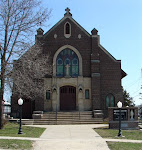Saturday, October 16, 2010
Newspaper Article for Chariton Herald-Patriot
written by Father Pisut and printed in the Chariton Herald-Patriot on Thursday, October 14.
Newspaper Article for Chariton Herald-PatriotDespite the fact that Catholics and Protestants both believe in the Bible there are often difficulties in our relationships due to misunderstandings surrounding the role of the Bible in the life of faith. As a result it might be helpful to help present a Catholic understanding of Holy Scripture for the benefit of our Protestant brothers and sisters. This might also prove helpful for many Catholics who, as a result of the larger Protestant culture and poor formation have absorbed a Protestant understanding of Holy Scripture as well. The first thing to understand is that Catholics have a fundamentally different understanding of the role of the Bible in the life of faith as opposed to other Christians. Catholics believe that Christ established the Church and it is the Church that guides us. The Catholic Church compiled the canon of scripture over several centuries and decided what made up the Bible. While the Bible is integral to the deposit of Faith and everything that it teaches us in regards to faith and morals is true it is, nevertheless, just part of the Faith along with the Magisterium (teaching office) of the Church and Sacred Tradition. While other Christians revere the Bible they view it in a vacuum and use it (or rather claim to use it) as their sole authority. In fact the Bible as we know it did not exist at the time of Christ's death and it was the Church that passed on the Faith before the Bible was even composed. The Church gave life to the Bible which in turn gives life to the Church.
Another common assertion is that the Catholic Church in the past forbade persons to read the Bible. In order to address this let us consider the historical circumstances surrounding the issues. For centuries literacy was very low so most persons were unable to read the Bible. Even if they could read, the Church, concerned with the salvation of souls, needed to make sure that they understood the Bible properly. While the Protestant Reformation encouraged the reading of the Bible there is the inevitable and difficult reality of varying interpretations. Yet there can be only one truth. Catholics believe that he Church, guided by the Holy Spirit interprets the Bible for us. While the Church no doubt encourages persons to read the Bible more than they used to they never truly discouraged it but were concerned that persons had proper guidance. For a Catholic to read the Bible they must use an approved Catholic Bible with notes to help facilitate their understanding. Certain passages of the Bible, but not all, do have definitive interpretations that Catholics are bound to adhere to but outside of that Catholics are free to find spiritual solace as long as whatever meanings they may find do not conflict with the Catholic Faith. While Protestantism espouses a personal interpretation of the Bible and feels uncomfortable being told what to believe we inevitably have the problem of being presented with one truth or several truths, the latter of which is not possible. Ultimately, we must remember that Catholics believe that Christ established the Catholic Church. The Church, guided by the Holy Spirit, gave us the Bible and has the authority and obligation to interpret its meaning for us for the salvation of our souls.
Of course there is the obvious issue of the difference between the Catholic and the Protestant Bible. There are seven books of the Old Testament not in the Protestant Bible: Tobit, Judith, Wisdom, Ecclesiasticus, Baruch and 1 and 2 Maccabees, as well as portions of Esther (10:4 to 16:24) and Daniel (3:24-90 and chapters 13 and 14). While Protestants call these books the Apocrypha Catholics call them deutero-canonical works. These books were removed from the Protestant version of the Bible for a couple of reasons. After the destruction of Jerusalem in 70 AD the Jewish community sought to distinguish itself from the growing Christian community. As part of this they rejected certain writings, though in common use, that were not originally written in Hebrew. These seven books were written in Greek and are part of what is known as the Septuagint. Luther and other reformers used this as a rational for removing them as well as the fact that these books contained elements that conflicted with their theology. However, these books would have been known to Jesus and his followers and used by them. Ultimately, under the authority of the Catholic Church, which composed the canon of Holy Scripture, these books were included in the Bible. This process of discerning which books would be in the Bible was a long one and was not complete until the 4th century. The canon of Sacred Scripture which contained these books and which we have today was confirmed by the Council of Trent in the 16th century in response to the Protestant Reformation.
It is important in ecumenical relations to understand that Catholics and Protestants have a fundamentally different understanding of the role of Holy Scripture and Catholics do indeed rejoice in our shared love of Holy Writ. However, while Protestants generally see the Bible as the sole rule of faith Catholics see it as a part of the Faith, a very important one to be sure that cannot be contradicted, but nevertheless just part of the Faith. As a result, for Catholics the Bible must be received and interpreted through the Church which was entrusted with it and formed it.


